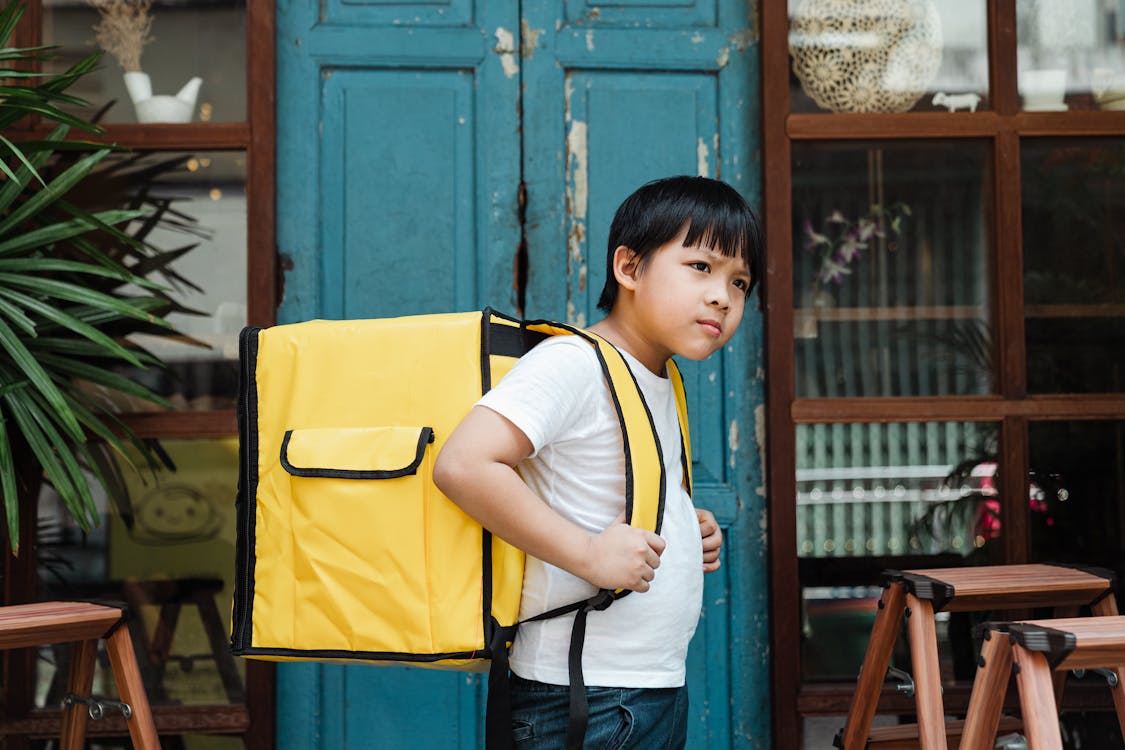Table of Contents
- What Exactly Are Life Skills, and Why Are They So Crucial?
- The Family: The First and Most Influential School of Life
- Key Life Skills Nurtured Within the Family Unit
- Communication Skills: The Art of Connection
- Emotional Intelligence (EQ): Understanding and Managing Feelings
- Problem-Solving and Decision-Making: Navigating Life’s Challenges
- Practical Skills for Independent Living: The Nitty-Gritty
- Financial Literacy: Understanding the Value of Money
- Resilience and Coping Mechanisms: Bouncing Back from Setbacks
- Social Skills and Empathy: Navigating Relationships
- Values and Ethics: Building a Moral Compass
- How Families Can Actively Foster Life Skills: Actionable Insights & Practical Tips
- Challenges and Considerations in Modern Family Life
- The Enduring Legacy: Why Family’s Role in Life Skills is Irreplaceable
The Unsung Architects: How Family Shapes Essential Life Skills
Ever watched a young adult struggle with boiling an egg, managing a simple budget, or resolving a minor conflict and wondered, “Didn’t anyone teach them this?” While schools excel at academics, the foundational classroom for life’s most crucial skills is often much closer to home: the family. Long before we step into a formal educational setting, our families are tirelessly, often unknowingly, sculpting our ability to navigate the complexities of the world. The role of family in developing life skills is not just important; it’s paramount, laying the groundwork for resilience, independence, and overall well-being.
In a world that’s rapidly changing, demanding more adaptability and emotional intelligence than ever before, these homegrown skills are the true currency of success. So, let’s pull back the curtain and explore the profound and often underestimated influence our families have on equipping us for life’s grand adventure.
What Exactly Are Life Skills, and Why Are They So Crucial?
Before we dive deep into the family’s role, let’s clarify what we mean by life skills. These aren’t just about knowing how to do your laundry or cook a meal (though those are definitely part of it!). The World Health Organization (WHO) defines life skills as “abilities for adaptive and positive behavior that enable individuals to deal effectively with the demands and challenges of everyday life.”
Think of them as a versatile toolkit, broadly categorized into:
- Thinking Skills/Cognitive Skills: Problem-solving, decision-making, critical thinking, creativity, self-awareness.
- Social Skills/Interpersonal Skills: Communication, empathy, cooperation, assertiveness, relationship building.
- Emotional Skills: Managing emotions (emotional regulation), coping with stress, resilience.
- Practical Skills: Daily living tasks like cooking, cleaning, budgeting, basic repairs, personal care.
Why do they matter so much? Individuals equipped with strong life skills are better prepared to:
- Make informed decisions.
- Communicate effectively and build healthy relationships.
- Solve problems creatively and resourcefully.
- Manage their finances and live independently.
- Cope with stress and setbacks, fostering mental well-being.
- Contribute positively to their communities.
Essentially, life skills empower us to lead fulfilling, productive, and independent lives. They are the bridge between knowledge learned and knowledge applied successfully in real-world situations.

The Family: The First and Most Influential School of Life
From our very first breath, our families begin shaping us. This isn’t a formal curriculum with textbooks and exams, but rather a continuous, organic process of learning through observation, interaction, and experience. The family environment serves as the primary incubator for life skills development.
Modeling Behavior: Monkey See, Monkey Do (and Learn!)
Children are like sponges, constantly observing and imitating the behaviors of those around them, especially their primary caregivers. How parents or older siblings handle stress, communicate during disagreements, manage household responsibilities, or show kindness to others becomes a powerful, unspoken lesson. If a child sees their parents calmly discussing a budget or working together to fix a leaky faucet, they’re learning far more than just the mechanics of finance or plumbing; they’re learning cooperation, problem-solving, and emotional regulation.
This modeling extends to:
- Communication styles: Do family members listen actively, or interrupt? Is communication open and honest, or guarded and passive-aggressive?
- Conflict resolution: Are disagreements handled with yelling and slamming doors, or through calm discussion and compromise?
- Emotional expression: Are emotions acknowledged and discussed, or suppressed and ignored?
- Work ethic and responsibility: Do children see adults taking pride in their work, meeting commitments, and contributing to the household?
The adage “actions speak louder than words” couldn’t be truer in the context of family influence on life skills.
Creating a Safe and Supportive Learning Environment
A crucial aspect of the family’s role is providing a safe space where children feel comfortable trying, failing, and trying again without fear of harsh judgment. Learning life skills inevitably involves making mistakes. Whether it’s burning the toast, mishandling an allowance, or saying the wrong thing in a social situation, these are all learning opportunities.
Families that foster a growth mindset—emphasizing effort and learning from errors rather than solely focusing on perfect outcomes—empower children to take risks and develop resilience. This supportive scaffolding allows children to internalize skills more deeply because they’re learned through personal experience, with gentle guidance rather than punitive criticism.
Early Childhood Experiences: Laying the Groundwork
The early years are particularly formative. Simple interactions like sharing toys teach negotiation and empathy. Being assigned small chores like putting away their toys instills a sense of responsibility. Even seemingly mundane routines – bedtime stories that spark imagination, family meals that encourage conversation – contribute to a child’s developing skill set. These early experiences create the neural pathways and emotional foundations upon which more complex life skills will be built later on.
Key Life Skills Nurtured Within the Family Unit
The spectrum of life skills touched by family influence is vast. Let’s explore some of the most critical ones:
Communication Skills: The Art of Connection
Effective communication is the bedrock of all healthy relationships and successful interactions. Families are where we first learn to:
- Listen actively: Truly hearing what others are saying, not just waiting for our turn to speak.
- Express ourselves clearly: Articulating thoughts, feelings, and needs respectfully.
- Understand non-verbal cues: Reading body language and tone of voice.
- Engage in constructive dialogue: Discussing differing opinions without resorting to aggression.
- Resolve conflicts: Learning to negotiate, compromise, and find mutually agreeable solutions.
Dinner table conversations, family meetings, and even disagreements, when handled constructively, are prime opportunities for honing these skills.
Emotional Intelligence (EQ): Understanding and Managing Feelings
Emotional intelligence – the ability to understand and manage one’s own emotions, and to understand and influence the emotions of others – is increasingly recognized as vital for success and happiness. Families play a huge role in nurturing EQ by:
- Helping children identify and name their emotions: “I see you’re feeling frustrated because your tower fell down.”
- Validating feelings: Letting children know it’s okay to feel sad, angry, or scared.
- Teaching healthy coping mechanisms for stress and disappointment: Deep breathing, talking about it, taking a break.
- Modeling empathy: Showing understanding and compassion for others’ feelings.
A family that encourages open emotional expression and provides tools for emotional regulation gives children a significant advantage in life.

Problem-Solving and Decision-Making: Navigating Life’s Challenges
From deciding what game to play as a toddler to navigating complex social dilemmas as a teenager, life is full of problems to solve and decisions to make. Families can cultivate these skills by:
- Involving children in age-appropriate decision-making: “Should we go to the park or the library today?”
- Brainstorming solutions together when problems arise: “The cake recipe needs eggs, but we’re out. What can we do?”
- Allowing children to experience the natural consequences of their choices (within safe limits).
- Encouraging critical thinking: Asking “why” and prompting them to think through different perspectives.
Learning to analyze situations, weigh options, and make thoughtful choices is a skill honed through practice, and the family provides countless daily opportunities.
Practical Skills for Independent Living: The Nitty-Gritty
These are often the most visibly recognized life skills. Can a young person cook a nutritious meal, manage their laundry, keep their living space clean, or handle a simple repair? These practical skills are essential for independence.
Families teach these by:
- Assigning age-appropriate chores: Setting the table, making their bed, helping with cooking or cleaning.
- Involving children in household tasks: Grocery shopping, meal preparation, gardening.
- Teaching basic maintenance: How to change a lightbulb, sew on a button, or unclog a drain.
- Personal care routines: Hygiene, dressing appropriately for the weather.
These skills not only foster independence but also build confidence and a sense of competence.

Financial Literacy: Understanding the Value of Money
In a world driven by consumerism, understanding personal finance is more critical than ever. Financial literacy for kids often begins at home. Families can teach:
- The concept of money: Where it comes from (work) and what it’s used for.
- Budgeting and saving: Giving an allowance and guiding them on how to manage it, saving for a desired item.
- Needs vs. wants: Making conscious spending choices.
- The basics of banking and debt (at an appropriate age).
Early lessons in financial responsibility can prevent significant stress and difficulties later in life.
Resilience and Coping Mechanisms: Bouncing Back from Setbacks
Life is not always smooth sailing. Disappointments, failures, and losses are inevitable. Resilience – the ability to bounce back from adversity – is a crucial life skill. Families cultivate resilience by:
- Providing a stable and supportive emotional base.
- Normalizing failure as a part of learning and growth.
- Modeling healthy coping strategies for stress and disappointment.
- Encouraging perseverance and a positive outlook.
- Sharing family stories of overcoming challenges.
Children who learn that it’s okay to fail and that they have the inner strength and support to get back up are better equipped for life’s inevitable hurdles.
Social Skills and Empathy: Navigating Relationships
The family is a microcosm of society. It’s where children first learn how to interact with others, share, take turns, respect boundaries, and show empathy. These social skills are fundamental for building and maintaining all types_of relationships.
Families can foster these by:
- Encouraging cooperative play and sharing among siblings or peers.
- Teaching manners and respectful interaction.
- Discussing social situations and different perspectives.
- Modeling empathetic behavior towards family members and others.
Values and Ethics: Building a Moral Compass
While not always categorized as a ‘skill,’ a strong moral compass is integral to making good life choices. Families are primary in instilling values like honesty, integrity, responsibility, compassion, and respect. This is done through explicit teaching (discussions about right and wrong) and, more powerfully, through consistent modeling of these values in everyday actions and decisions. When family members act in accordance with proclaimed values, it provides a clear and compelling guide for children.
How Families Can Actively Foster Life Skills: Actionable Insights & Practical Tips
Understanding the family’s role is one thing; actively and intentionally nurturing these skills is another. Here are some practical ways families can make a difference:
- Encourage Responsibility Through Chores: Start early with age-appropriate tasks. This teaches accountability, contributes to the family unit, and builds practical skills. Make it clear that contributions are valued.
- Involve Children in Family Decision-Making: For choices that affect them, solicit their input. This could range from meal planning to vacation destinations. It teaches them consideration, compromise, and the process of making choices.
- Teach Through Real-Life Scenarios: Use everyday occurrences as teachable moments. A grocery trip can be a lesson in budgeting. A burnt dinner can be a lesson in problem-solving and resilience.
- Foster Open Communication: Create an environment where everyone feels safe to express their thoughts and feelings without judgment. Practice active listening. Have regular family check-ins or meetings.
- Be a Good Role Model (Walk the Talk): Children learn more from what you do than what you say. Demonstrate the life skills you want them to develop – manage your stress well, communicate respectfully, admit your mistakes.
- Allow for Mistakes and Natural Consequences: Resist the urge to always swoop in and rescue. Experiencing the natural (safe) consequences of their actions is a powerful teacher. A forgotten lunch might mean a hungry afternoon but a learned lesson in responsibility.
- Promote Reading and Critical Thinking: Read together, discuss books, news events (age-appropriately), and different viewpoints. Ask open-ended questions that encourage them to think for themselves.
- Encourage Hobbies and Extracurricular Activities: These provide opportunities to develop specific skills, learn teamwork, discipline, and pursue passions outside the home and school.
- Teach Basic Financial Management: Introduce concepts of earning, saving, spending, and giving through allowances or payment for extra chores. Help them set financial goals.
- Focus on Effort, Not Just Outcomes: Praise their hard work, perseverance, and the strategies they use, rather than just a good grade or a win. This cultivates a growth mindset.
- Practice Gratitude and Empathy Together: Make it a habit to talk about things you’re grateful for. Encourage acts of kindness and discuss how others might be feeling in different situations.
- Set Clear Expectations and Boundaries: Consistency in rules and expectations provides a secure framework within which children can learn and grow.

Challenges and Considerations in Modern Family Life
While the ideal is a supportive family actively teaching life skills, modern life presents challenges:
- Varying Family Structures and Resources: Single-parent households, blended families, families facing economic hardship, or those with limited time due to work demands may find it more challenging, though not impossible, to dedicate focused effort. The key is intention and leveraging available moments.
- The Impact of Technology: Technology can be a double-edged sword. While it offers learning resources, excessive screen time can detract from face-to-face interaction, outdoor play, and practical skill development. Families need to find a healthy balance.
- Balancing Support with Fostering Independence (Avoiding ‘Helicopter Parenting’): There’s a fine line between being supportive and over-parenting. Children need the space to make their own mistakes and learn from them to truly develop independence. Sometimes, the best way to teach is to step back.
- Cultural Differences: The specific life skills emphasized and the methods of teaching them can vary across cultures. What’s considered essential or how it’s taught in one culture might differ in another, but the underlying principle of family as a teacher remains.
It’s important to acknowledge these challenges and adapt strategies accordingly. The quality of interaction and intentionality often matters more than the quantity of time or resources.
The Enduring Legacy: Why Family’s Role in Life Skills is Irreplaceable
In the grand tapestry of a child’s development, the threads woven by the family are arguably the most vibrant and enduring. While schools, peers, and society at large play their parts, the family is the original and most consistent life skills academy. It’s where the seeds of communication, emotional intelligence, resilience, practicality, and sound judgment are planted and nurtured.
The efforts made within the family to instill these skills ripple outwards, influencing not only an individual’s personal success and happiness but also their capacity to contribute meaningfully to society. By consciously embracing their role as life skill educators, families don’t just raise children; they raise capable, confident, and compassionate human beings ready to navigate the complexities of the world with grace and competence.
So, cherish those everyday moments—the shared chores, the dinner table debates, the bedtime stories, the comforting hugs after a tough day. They are far more than just routines; they are the building blocks of a well-lived life, carefully laid by the loving hands of family.









